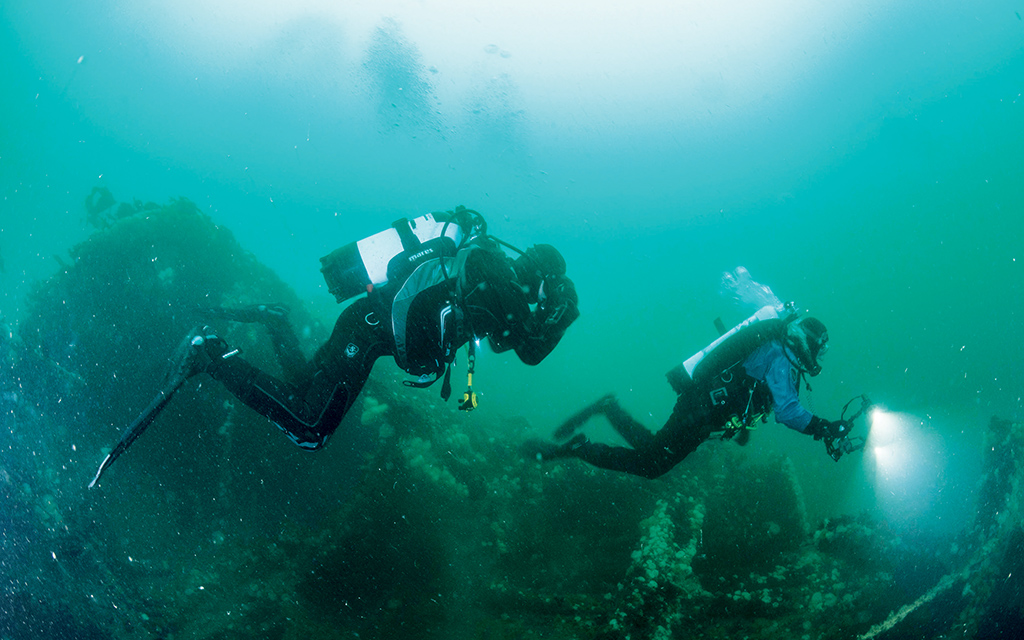
This inclusive, industrious Cumbrian club is experiencing a post-pandemic rise in membership. Kristina Pedder dropped in on club night to say hello...
Steady as she goes,” is the sea captain’s call to the helmsman to keep on the current course, and it reflects very well the ongoing activity at Furness Diving Club. People of all ages and backgrounds are welcomed to begin their journey into the world of scuba diving. The club is committed to Diving for All, and encourages all members to progress their qualifications and gain a broad range of experience while enjoying their diving.
Furness Diving Club has historically been successful in raising funds through local businesses, and won a modest Sports Council Grant in the past. Any fundraising success is attributed to the club’s access-for-all policy and provision of training and equipment to people who might otherwise be unable to experience scuba diving. In 2023, trainees are joining the club at a record level.
When was the club formed?
Furness Diving Club was formed in the mid-1950s. The founder members did their early basic training locally in Cavendish Dock, even in the depths of winter when they had only jeans and woolly jumpers to protect them from the cold. Things were very different back then. Now we introduce newcomers to our sport in warm safe waters protected by drysuits.
Where are you based?
Barrow-in-Furness is a port town in the north-west of England, on the edge of the English Lake District and on the shores of Morecambe Bay.
Who are your members?
Our 53 diving members are a mixed bunch across genders (17 per cent are women), ages (nine are junior members) and all walks of life. The vast majority are open-circuit recreational divers. To be honest, like many clubs, our age profile is towards the older end of the spectrum. We want to continue to recruit and train new members, particularly younger members from more diverse backgrounds, to ensure the health and longevity of the club. We welcome all nationalities and all backgrounds.
Is the membership growing?
From the mid-1980s to 2019, Furness Diving Club had between 40 and 50 members, Then, during the Covid pandemic, numbers fell away slightly. Since 2022, we have reintroduced try dives and there is a healthy interest in them. We also have an improved social media presence and numbers have grown to 53. The number of trainees has grown slowly over the last 18 months from six to 18.

L-to-R: Jodie Evans and Jessica Townsend’s first pool session; Boarding a Red Sea Zodiac; Try Dives at Barrow Leisure Centre
That’s a lot of new trainees…
Yes, 30 per cent of our members are trainee Ocean Divers. Of the rest: two per cent are Ocean Divers; 28 per cent are Sports Divers; 13 per cent are Dive Leaders and the remaining 26 per cent are Advanced Divers. On joining the club, we give support to individuals to complete their initial theory lessons and pool training. We do not rush trainees through the course, preferring them to gain confidence and experience. We encourage online learning for later courses, but encourage face-to-face learning for Ocean Divers.
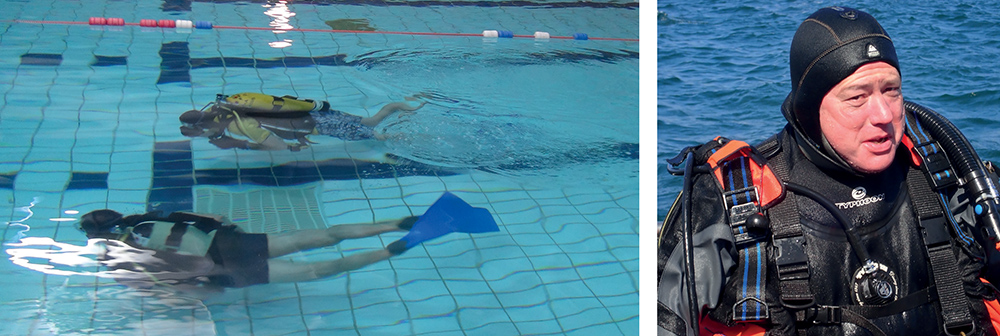
L-to-R: pool training at Barrow Leisure Centre; Sports Diver Darren Fine at Eyemouth
How do you manage training for such a large cohort?
Trainees are grouped in pairs or threes, as we think this works well for both trainees and instructors. Once we get to open-water training, we put the onus squarely on the trainee. We encourage them to get in touch with an instructor to book a training dive or two at a convenient time. We dedicate one Sunday a month to training for both trainees and experienced divers, encouraging skills that are not used often to be refreshed in a controlled manner.
That sounds very organised…
We publish a quarterly dive planner indicating where the weekly Sunday club dive is likely to take place and try to introduce some variety and new dive locations from time to time. There are sometimes changes and additional days or weekends added as people think about other opportunities.
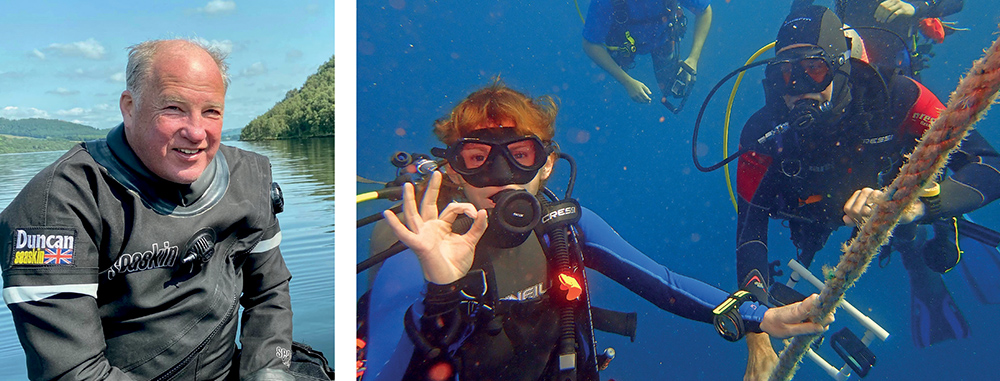
L-to-R: Diving Officer Duncan Scott; Red Sea deco stop
Who is on the instructor team?
The training team is an Advanced Instructor, eight Open Water Instructors, one of whom is also Diving for All qualified and two of whom are also snorkelling instructors, supported by three Assistant Diving Instructors. We try to have regular Basic Life Support training, including defibrillator courses, and encourage all members to refresh their skills. We also have two Diver Cox’n/Boat-handling Instructors: boat-handling training is popular.
Ah, the club owns a boat then?
The club has two boats: a Delta X-patrol RIB with an inboard diesel engine and a small Seasearch SIB with a 20hp outboard engine.
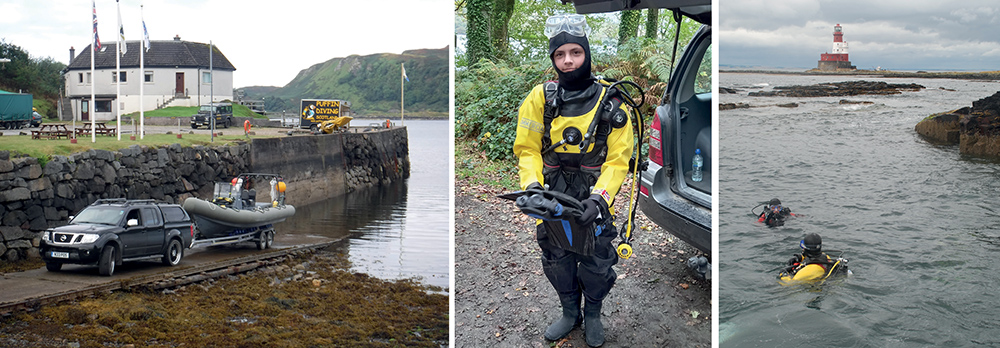
L-to-R: Oban; Shane King, 13, at his first open water dive at Bayliff Wood, Coniston; seals at the Farnes
What other resources does the club have?
There are four sets of dedicated pool-training gear and four more sets of open-water equipment, plus drysuits of various sizes to help our trainees. We hire the local leisure centre pool for an hour each Tuesday evening for try dives, training and recreational swimming. We have a storage facility come boat house within Barrow Port Authority’s secure compound, which we rent from the local council. We store our emergency equipment, training kit, compressors and boats there.
So, you are based by the water, do you get to dive there?
Following several years of lobbying Associated British Ports, the owners of Barrow docks, we have finally been granted permission to dive in an area of the dock system again, in a controlled manner. This has also paved the way for us to carry out Seasearch surveys to evaluate the native and invasive species that inhabit this area.
I hear that the docks have been in the news as a result…
Yes, when we finally got to dive in the docks in April, we were pleased to see the amount and diversity of life in there. Locals were astounded at our photos, which were published by local news outlet The Mail.
Where else does the club dive?
We are spoilt for choice really. Our base is less than half an hour from most of the English Lakes so members regularly dive in Coniston Water, Windermere, Wastwater Ullswater and Crummock. We can dive in the sea locally, but conditions and visibility are not often the best. Loch Long and Loch Fyne are the nearest sea lochs and we go there to dive on the odd weekend along with visits to Eyemouth and St Abbs. We are not far from Capenwray, which is excellent for training.
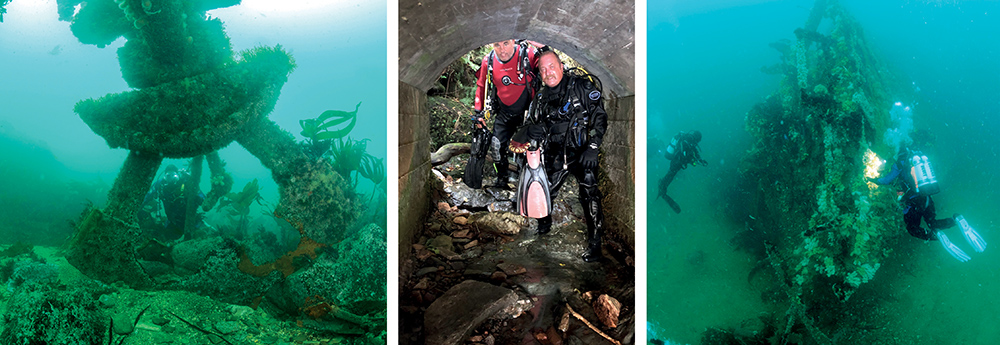
L-to-R: wreck of Nevada II, Isle of Coll; Paul Crarey and Paul Dunford at The Caves, Loch Long; wreck of the Tapti, Coll
What type of diving goes on?
Mostly we do shore dives on walls and reefs. We occasionally dive from our RIBs, but it is a long way to travel to good diving areas and we find it difficult to find people willing and able to tow the boats, so we tend to have at least one week-long hard boat charter plus a couple of (long) weekend charters generally in Scotland. In recent years we have been to Orkney, Mull and Skye. We booked a week’s charter around Shetland in 2023, as well as a long weekend cruising around Mull.
What about diving with a purpose?
Generally, the club supports recreational diving and Diving For All; we are always advertising opportunities to dive through our try dive scheme. We have run a number of Seasearch courses and now have a number of qualified Observers and Surveyors. Others support the work of Ghost Fishing UK and Project Sea Grass. We also have a number of trained Marine Life Medics. One or two individuals take part in more technical diving, undertaking serious expeditions that last year included the discovery of HMS Jason off the west coast of Scotland almost 105 years to the day it sank.
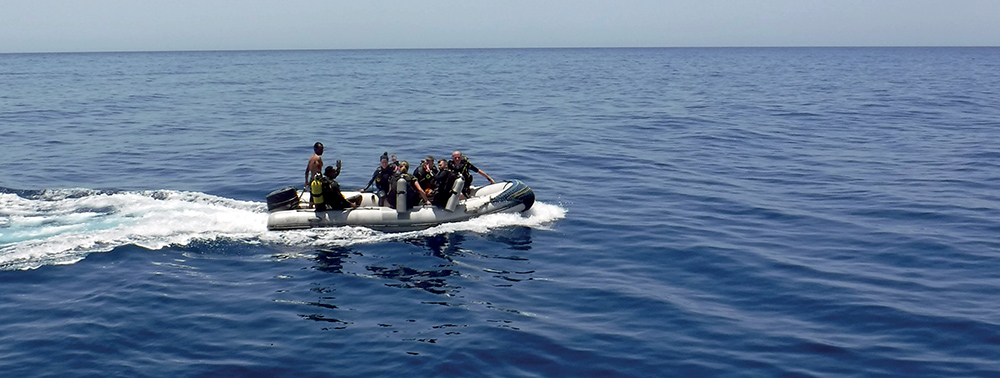
A journey to Egypt's deep south
Has the club been involved in any special projects?
The club did help recover an historic early steamboat, Dolly, from Lake Windemere many years ago. Recently, we have had exploratory talks with aircraft historians about looking for relics in Lake Windermere. Initially, water planes were built and tested there prior to the First World War, and later there was a factory building and repairing flying boats during the Second World War. Some initial dives have taken place but restricted visibility in the lake and the amount of silt that has been deposited over the years makes things quite difficult without targeted sonar support.
One of our members is a successful detectorist, and has recently been filmed for an episode of a TV series called Lost and Found. The episode was filmed in Ullswater and was a search for a lost ring, bracelet and chain, which were of some sentimental value. The ring was found, along with many other items including apple watches, iPhones and more.
What is the club planning for the next few years?
At Furness Diving Club, we want to continue to engage with the local community highlighting scuba diving as a rewarding pastime and offering a diving experience for anyone who wants to try it no matter what their background or ability. Hopefully we can encourage them to engage with the sport at some point in the future. Engagement with BSAC regional teams is also important to achieve our aim of developing skills and broadening experience, as well as for instructor training. We’d like to see more support for newly trained instructors and some regional training for Ocean Divers.
Going back to our assets, we want to say that the club’s biggest asset is its members, in particular those who are active in keeping the club running, or offering training and development while maintaining high safety standards and financial stability. In the current economic climate, we have to be careful how we spend our money. Keeping people engaged and maintaining an inclusive club culture inside and outside of diving is hard work.
Join the BSAC community
The BSAC network is working together to keep people connected to the sport. With online training, special interest webinars, competitions, support to clubs and the trade, and much more...we'd love you to join us.
This Club Focus was originally published in SCUBA magazine, Issue 139 October 2023. For more membership benefits, visit bsac.com/benefits.
If you want to learn to dive in Barrow-In-Furness with Furness Diving Club, please contact Oliver Coulson.
Images in this online version may have been substituted from the original images in SCUBA magazine due to usage rights.



